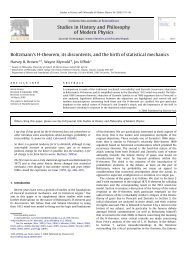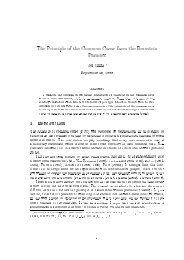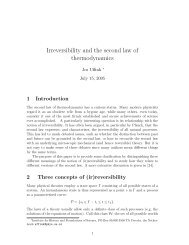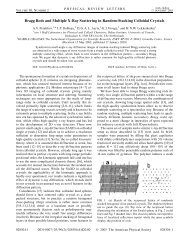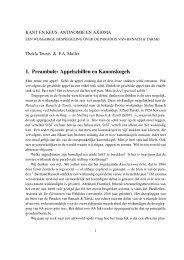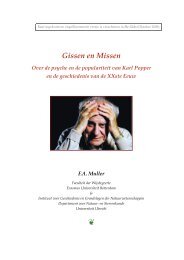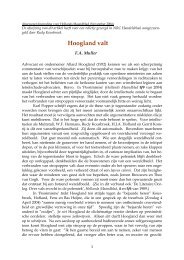Subjective probability and statistical physics
Subjective probability and statistical physics
Subjective probability and statistical physics
You also want an ePaper? Increase the reach of your titles
YUMPU automatically turns print PDFs into web optimized ePapers that Google loves.
However, one often also reads that the theorems of mathematics or logic are<br />
‘objective’, even though they do not refer to any concrete object at all. What seems to<br />
be intended in such cases is that they follow strictly from axioms <strong>and</strong> proof protocols,<br />
so that no one accepting these rules could dispute the validity of these results. They<br />
are not objective in the previous sense, i.e. referring to properties of physical objects<br />
— indeed, many mathematicians are Platonists <strong>and</strong> believe that mathematics purely<br />
resides in the mind or the realm of ideas — but only in the sense that there can be<br />
no rational disagreement about their validity.<br />
Again, one could point out that objective validity is not so much an attribute<br />
of a theorem in isolation, but only in relation to a given system of axioms, rules of<br />
proof <strong>and</strong> so on, but this does not change anything essential. By contrast, then, the<br />
predicate ‘subjective’ is used in this second sense for statements that do not have a<br />
rationally compelling justification.<br />
2 A Brief history of subjective <strong>probability</strong><br />
2.1 Jacob Bernoulli<br />
The historical development of the theory of <strong>probability</strong> has been rather well-documented<br />
<strong>and</strong> studied (Hacking 1975, Hacking 1990, Krüger et al. 1990). The first main text<br />
in this field is Jacob Bernoulli’s Ars Conject<strong>and</strong>i (published posthumously in 1713).<br />
Indeed, it is the first source in which the term <strong>probability</strong>, in its modern quantitative<br />
sense, is coined.<br />
Bernoulli distinguishes between objective <strong>and</strong> subjective certainty. According to<br />
him, every event in the past, present or future is objectively certain: the outcome of<br />
a throw of a die just as much as tomorrow’s weather. Otherwise, he says, one could<br />
not make sense of Divine providence <strong>and</strong> omniscience. But certainty considered with<br />
respect to us, i.e. subjective certainty, may come in degrees. There are things we<br />
know, by revelation, reason, perception, experience or introspection or otherwise.<br />
These things have the highest degree of subjective certainty. But of other things we<br />
are less certain, our judgments might range from ”practically certain”, ”probable”,<br />
”doubtful”, ”improbable”, etc.<br />
Bernoulli defines <strong>probability</strong> as the degree of subjective certainty. He emphasised<br />
that <strong>probability</strong> does not reside in the facts or events that we assign probabilities to.<br />
Rather, <strong>probability</strong> assignments represent an epistemic judgement. The assignment<br />
or evaluation of probabilities is a human endeavour, <strong>and</strong> this is what constitutes the<br />
art of conjecturing.<br />
Bernoulli also emphasized that a <strong>probability</strong> assignment to a given event may differ<br />
from person to person, depending on what information they possess. He relates, for<br />
example, a story of three ships setting sail from a harbour. At some point in time the<br />
news arrives that one of the three ships has been wrecked. Given this information,<br />
<strong>and</strong> nothing more, it might seem reasonable to assign an equal <strong>probability</strong> of 1/3<br />
to each of the three ships for having suffered this fate. But then, Bernoulli says,<br />
suppose someone knows that exactly one ship had been poorly prepared: its captain<br />
was incompetent, its crew inexperienced, its maintainance had been neglected, an<br />
so on. For the person who has access to this information it would be more likely<br />
that precisely this ship is the one wrecked, rather than any of the other two. Of<br />
2



